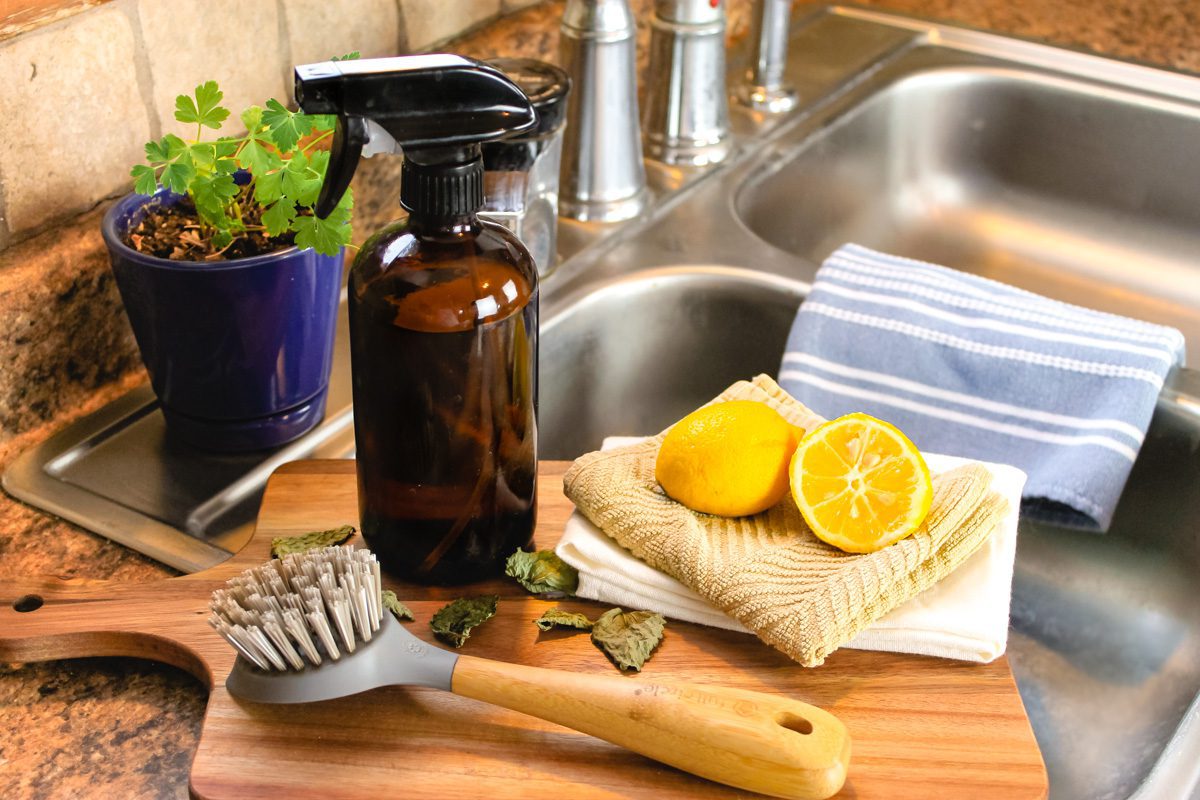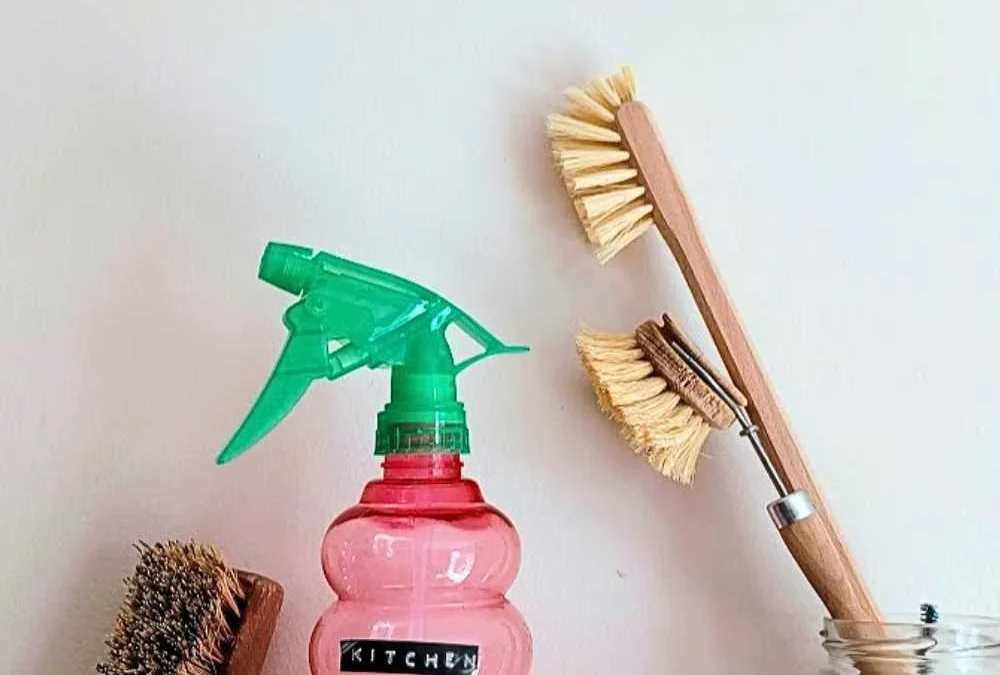Do you ever feel overwhelmed by the countless bottles of chemical cleaners cluttering your kitchen? You’re not alone.
Many people are seeking safer, more natural alternatives to keep their homes clean and fresh. Imagine a cleaner that’s not only effective but also gentle on your hands, safe for your family, and kind to the environment. Sounds too good to be true?
It’s not! With a few simple ingredients, you can whip up your own natural kitchen cleaner. This guide will show you how to make a cleaner that cuts through grease and grime without the harsh chemicals. Dive into this article to discover how you can transform your cleaning routine and enjoy a sparkling kitchen that’s as fresh as it is healthy. Let’s get started!
Benefits Of Natural Kitchen Cleaners
Create natural kitchen cleaners to enjoy a safer, chemical-free home. These cleaners are gentle yet effective. Easy to make with simple ingredients. They are better for your health and the environment. Plus, they help reduce waste and save money. Enjoy a sparkling kitchen without harmful chemicals.
Natural kitchen cleaners are gaining popularity, and for good reason. They offer a multitude of benefits that make them a smart choice for anyone looking to maintain a clean and healthy kitchen environment. Switching to natural cleaners can be an easy way to reduce exposure to harsh chemicals while still achieving sparkling results. Let’s dive into why these cleaners are worth considering for your kitchen.Environmentally Friendly
Natural kitchen cleaners are kind to our planet. Unlike their chemical counterparts, they break down quickly and don’t leave harmful residues. Imagine the peace of mind knowing that your cleaning routine is not contributing to pollution. Are you ready to make a positive change for the environment right from your kitchen?Healthier Home
By using natural cleaners, you minimize exposure to toxic substances. These toxins can linger in the air and on surfaces, potentially affecting your health. Ever noticed sneezing or irritation after using chemical cleaners? Natural alternatives can help keep those symptoms at bay, providing a safer space for you and your family.Cost-effective
Natural cleaners are often made from ingredients you already have at home. Think vinegar, baking soda, and lemon juice. These are not only affordable but also effective. Why spend more on expensive chemical cleaners when simple kitchen staples do the trick?Effective Cleaning
Don’t underestimate the power of natural ingredients. They can tackle grease, grime, and bacteria with surprising efficiency. I once cleaned a stubborn stain with baking soda and was amazed at the result. Have you tried using lemon juice to shine your kitchen fixtures? You might be surprised at how effective it is.Customizable Scents
Create your own delightful scents by adding essential oils to your cleaner mix. This can make cleaning feel less like a chore and more like a refreshing experience. Picture the aroma of lavender or citrus filling your kitchen as you clean. Isn’t it time to enjoy the process as much as the result? Switching to natural kitchen cleaners can be a simple yet impactful change in your daily routine. Would you consider making your kitchen a healthier, more sustainable space?
Credit: www.pinterest.com
Essential Ingredients For Diy Cleaners
Crafting a natural kitchen cleaner involves simple ingredients. Mix vinegar, baking soda, and lemon juice. These elements effectively tackle grease and grime. Essential oils can add a pleasant scent. This DIY cleaner is safe and eco-friendly, perfect for maintaining a clean kitchen environment.
Making your own kitchen cleaner with natural ingredients is both easy and rewarding. You might wonder which ingredients are truly essential for effective DIY cleaners. Let’s dive into some key ingredients you should have on hand. These common items are not only affordable but also incredibly versatile.Vinegar And Its Uses
Vinegar is a powerhouse in the world of natural cleaning. It’s great for cutting through grease and removing odors. Use it to clean countertops, sinks, and even your microwave. Just mix equal parts of water and vinegar in a spray bottle. Remember, the smell of vinegar fades as it dries, leaving your kitchen fresh and clean.Baking Soda As A Cleaning Agent
Baking soda is your go-to for scrubbing and deodorizing. Its gentle abrasive nature makes it perfect for tackling tough stains. Sprinkle it on surfaces like stovetops and inside the oven. Add a bit of water to form a paste for extra cleaning power. Baking soda is also fantastic for keeping your fridge smelling fresh.Power Of Lemon Juice
Lemon juice brings a fresh scent and natural disinfecting properties. It’s effective for cutting through soap scum and hard water stains. Use it to polish stainless steel or brighten your cutting boards. Simply squeeze some lemon juice onto the surface and wipe it clean. A half lemon dipped in salt can also be a great tool for scrubbing.Essential Oils For Fragrance
Essential oils add a lovely fragrance to your DIY cleaners. They also bring additional antibacterial properties. Consider using oils like tea tree, lavender, or lemon. Just a few drops in your vinegar solution can make a world of difference. Which scent will you choose to make your kitchen cleaner uniquely yours? Creating your own natural kitchen cleaner is not only simple but also customizable. Have you tried any of these ingredients in your cleaning routine? You might find that they outperform many commercial cleaners. Plus, you’ll enjoy the peace of mind that comes with using safe, natural products.Simple Recipes For Natural Cleaners
Creating natural kitchen cleaners at home isn’t just about saving money—it’s a fun and rewarding process that benefits your health and the environment. With a few simple ingredients, you can make effective and safe cleaning solutions that work wonders. Whether you’re aiming to tackle everyday messes, stubborn stains, or want streak-free surfaces, these recipes offer you a practical way to maintain a clean and fresh kitchen.
All-purpose Cleaner
To make a versatile all-purpose cleaner, mix equal parts of white vinegar and water in a spray bottle. Add a few drops of essential oil, such as lemon or lavender, for a pleasant scent. This mixture is great for countertops, stovetops, and sinks. Vinegar is a natural disinfectant that cuts through grease and grime effortlessly.
Have you ever noticed how some store-bought cleaners leave a sticky residue? This simple recipe avoids that, leaving surfaces clean and residue-free.
Degreaser For Stubborn Stains
Stubborn stains can be a real headache. For a powerful degreaser, combine one cup of baking soda with a quarter cup of liquid dish soap. Add enough water to form a paste. Apply this mixture to greasy spots and let it sit for a few minutes before scrubbing. Baking soda’s abrasive nature helps lift tough stains without scratching surfaces.
Remember when you fought with the stubborn grease on your oven door? This degreaser might be your new best friend, saving you time and effort.
Glass And Surface Cleaner
For sparkling glass surfaces, mix two cups of water with half a cup of vinegar and a quarter cup of rubbing alcohol. Pour the solution into a spray bottle, and add a few drops of essential oil for fragrance. Use it on windows, mirrors, and glass tabletops. This cleaner cuts through fingerprints and smudges, leaving a streak-free shine.
Have you ever wondered why your glass cleaner leaves streaks? This simple recipe ensures clarity, enhancing the shine of your glass surfaces.
Why settle for chemical-laden cleaners when you can make effective and safe alternatives at home? These recipes offer you control over the ingredients you use, helping you create a cleaner and healthier kitchen environment.
Tools And Supplies Needed
Gather white vinegar, baking soda, and lemon juice for a natural kitchen cleaner. Use a spray bottle to mix. A clean cloth is perfect for wiping surfaces.
Creating a natural kitchen cleaner is easier than you might think. It’s not only an eco-friendly choice but also a cost-effective one. Before diving into the process, let’s gather the tools and supplies needed for this DIY project. Having everything at hand will make the task more straightforward and enjoyable.Essential Tools
You don’t need a lot of gadgets to get started. A simple spray bottle is your primary tool. Choose a reusable one to reduce plastic waste. A small funnel can be a big help to prevent spills when transferring liquids into your spray bottle. It’s a lifesaver, especially if you’re as clumsy as I am! Measuring cups or spoons are vital for getting the right proportions. Accurate measurements ensure your cleaner is effective.Basic Supplies
White vinegar is the star of many natural cleaners. It’s a fantastic grease cutter and disinfectant. Make sure you have a bottle handy in your kitchen. Baking soda is another kitchen staple that works wonders. It acts as a gentle abrasive, perfect for tackling tough stains. Lemon juice not only adds a fresh scent but also boosts cleaning power. Fresh lemons or bottled juice work just fine.Optional Additions
Adding a few drops of essential oils like tea tree or lavender can enhance the fragrance. These oils also bring additional antibacterial properties to your cleaner. For those who prefer a bit of scrubbing action, a reusable cloth or sponge is ideal. They’re more sustainable than single-use paper towels.Storage Tips
Consider labeling your spray bottle to avoid confusion. Trust me, mistaking your cleaner for something else is not fun! Store your cleaner in a cool, dry place. This helps maintain its effectiveness over time.Quick Checklist
– Spray bottle – Funnel – Measuring cups/spoons – White vinegar – Baking soda – Lemon juice – Essential oils (optional) – Reusable cloth or sponge Have you ever thought about what goes into your cleaning products? Knowing that you’re using safe ingredients can be incredibly satisfying. Armed with these tools and supplies, you’re ready to make your kitchen sparkle naturally.Safety Tips For Using Natural Cleaners
Natural kitchen cleaners are safe and eco-friendly. Yet, using them requires caution. Safety tips help ensure effective and safe cleaning. Let’s explore some essential guidelines.
Label Ingredients Clearly
Always label your cleaners with ingredients. This prevents accidental misuse. It ensures everyone knows what’s inside. It also helps in case of emergency.
Avoid Mixing Cleaners
Mixing different cleaners can be dangerous. Some combinations release harmful fumes. Others can be ineffective. Stick to one cleaner at a time.
Store Cleaners Properly
Keep cleaners in cool, dry places. This prevents spoilage and maintains effectiveness. Avoid placing them near heat sources. This reduces risk of fire.
Use Gloves And Protective Gear
Wear gloves when handling cleaners. This protects your skin from irritation. Use masks in poorly ventilated areas. This keeps you safe from inhaling fumes.
Test On Small Areas First
Test new cleaners on small surfaces. This checks for damage or discoloration. It ensures your cleaner is safe for all surfaces.
Keep Away From Children And Pets
Store cleaners out of reach. Kids and pets can be curious. This prevents accidental ingestion or spills. Safety first.
Storage And Shelf Life Of Diy Cleaners
Crafting natural kitchen cleaners can be both effective and environmentally friendly. Store DIY cleaners in airtight containers to ensure freshness. A cool, dry place extends their shelf life for months.
When you decide to make your own natural kitchen cleaner, knowing how to store it and understanding its shelf life can save you time and effort. Proper storage not only extends the lifespan of your cleaner but also ensures it remains effective. You don’t want to end up with a cleaner that’s lost its potency. Imagine reaching for your DIY cleaner only to find it doesn’t cut through grease anymore. Let’s explore some practical tips to keep your concoction fresh and effective.How To Store Your Diy Cleaner
Storing your DIY cleaner properly is crucial. Use a clean, glass spray bottle to minimize chemical reactions. A dark-colored bottle can prevent sunlight from degrading the ingredients. Keep your cleaner in a cool, dark place. Your pantry or a cabinet under the sink works well. Avoid places that are too warm or receive direct sunlight, as heat can break down the natural ingredients.Understanding Shelf Life
The shelf life of a natural cleaner largely depends on its ingredients. Vinegar-based cleaners can last up to a year. Essential oils can extend this period due to their antibacterial properties. Always label your spray bottle with the date you made the cleaner. It’s a simple step that saves you from guesswork. If your cleaner starts to smell off or change color, it’s time to make a new batch.Signs Your Cleaner Has Gone Bad
Trust your senses. If the mixture develops an unpleasant odor, it’s likely gone bad. A change in color or consistency is another red flag. Consider how you use the cleaner. If it’s less effective in cleaning tasks it used to handle well, it might have lost its potency. Don’t risk using a cleaner that might not be doing its job.Refreshing Your Cleaner
Sometimes, you can refresh your cleaner with a simple addition. Adding a few more drops of essential oil can revive its scent and antibacterial properties. If you notice a decrease in cleaning power, a splash of vinegar can often do the trick. It’s an easy fix that can extend the usefulness of your current batch.Why You Should Make Small Batches
Making small batches ensures freshness. It also gives you the flexibility to tweak the recipe based on what you learn. You can experiment with different essential oils for varying scents and properties. It’s fun to find the perfect mix for your kitchen cleaning needs. Are you ready to extend the life of your DIY cleaner while keeping it effective? With these tips, you can maintain a fresh and potent cleaner that you can rely on.Eco-friendly Cleaning Practices
Eco-friendly cleaning practices are not just a trend; they are a necessity for a healthier home and planet. Many commercial cleaners contain harsh chemicals that can harm the environment and your family. Switching to natural kitchen cleaners is a simple yet powerful step towards sustainability. Imagine cleaning your kitchen with products that are safe enough to eat!
How To Choose Ingredients For Your Natural Cleaner
When creating your natural kitchen cleaner, start with ingredients you already have. White vinegar, baking soda, and lemon are great options. These items are effective in breaking down grease and fighting bacteria. You might be surprised how well they work compared to store-bought alternatives.
Mixing Your Ingredients
Combine equal parts of white vinegar and water for a powerful cleaning solution. Add a few drops of essential oil for fragrance. Essential oils like lavender or tea tree are not only pleasing to the nose but also have antibacterial properties. Wouldn’t it be nice to clean and freshen your kitchen at the same time?
Application Techniques
Apply your homemade cleaner using a spray bottle for easy use. Spray directly onto surfaces and wipe with a clean cloth. For tough stains, let the solution sit for a few minutes before wiping. Isn’t it satisfying to see stains disappear with a simple homemade solution?
Storage Tips For Your Cleaner
Store your cleaner in a cool, dark place to maintain its potency. Always label your bottle to avoid any mix-ups. You might find this process surprisingly simple and rewarding. Who knew eco-friendly cleaning could be so straightforward?
Benefits Of Eco-friendly Cleaning
By using natural cleaners, you reduce exposure to harmful chemicals. This practice is better for the environment and safer for your family. Plus, it’s often more affordable than buying commercial products. Isn’t it time you re-evaluate what’s under your sink?
Embrace the journey of eco-friendly cleaning. Your kitchen—and the planet—will thank you!
:max_bytes(150000):strip_icc()/ms-natural-cleaners-b420e0ed9b14456b9f37e4cdf7029b84.jpg)
Credit: www.marthastewart.com

Credit: wholemadehomestead.com
Frequently Asked Questions
What Ingredients Make A Natural Kitchen Cleaner?
Natural kitchen cleaners often use vinegar, baking soda, and lemon. Vinegar is a powerful disinfectant, while baking soda helps scrub and deodorize. Lemon adds a fresh scent and aids in cutting grease. These ingredients are environmentally friendly and safe for surfaces, ensuring your kitchen stays clean and green.
How Do You Use Vinegar For Cleaning?
Vinegar is versatile for cleaning surfaces, removing stains, and disinfecting. Mix equal parts of water and vinegar in a spray bottle. Spray on countertops and wipe with a cloth. For tough stains, let the solution sit for a few minutes before wiping.
Avoid using vinegar on marble or granite surfaces.
Can Baking Soda Remove Kitchen Odors?
Yes, baking soda effectively neutralizes kitchen odors. Sprinkle it on surfaces, let it sit for a few minutes, then wipe or rinse. It also works well in the fridge. Place an open box inside to absorb odors. Baking soda is non-toxic, making it a safe choice for eliminating smells.
Is Lemon Effective For Cutting Kitchen Grease?
Lemon is excellent for cutting grease due to its acidic nature. Combine lemon juice with water and use on greasy surfaces. The acidity breaks down grease, leaving surfaces clean. Plus, it leaves a fresh citrus scent. Avoid using lemon on sensitive surfaces like marble to prevent damage.
Conclusion
Creating your own natural kitchen cleaner is simple and effective. It keeps your kitchen clean without harsh chemicals. With a few ingredients, you can make a powerful cleaner. Vinegar, baking soda, and lemon are great choices. They fight germs and remove stains.
Plus, they are safe for your family and the planet. You save money and protect the environment. Try these natural solutions today. Enjoy a cleaner, healthier kitchen. It’s easy, affordable, and eco-friendly. Anyone can do it. Embrace the change and see the difference.
Your kitchen deserves the best care.

As the chief content writer, Hassan Al Sarker works as a professional kitchen-based content creator at Kitchen Liker.
In addition to reviewing the content published on Kitchen Liker, he ensures that it is accurate, relevant, and helpful. As a result, all the reviews and information published at Kitchen Liker are neutral and userfriendly.
Hassan Al Sarker has a bachelor’s degree in Hotel and Tourism Management From the Newyork University. Before joining Kitchen Liker, he was a contributor at Kitchen Club, United States.

